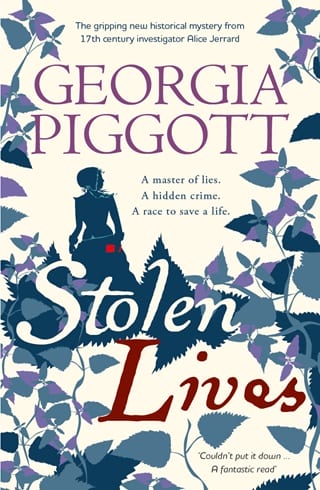PROLOGUESpring, 1625
PROLOGUE
It is not the lie that passeth through the mind, but the lie that sinketh in, and settleth in it, that doth the hurt
Francis Bacon (1551—1626)
Of Truth, 72:44
Spring, 1625
T he familiar scrape of high oaken gates being hauled open was no reason for heads to turn. At this end of the market square, hard by Wells cathedral, properties of men of substance abounded and several boasted gated archways. But as the coach, a statement in carved wood and gold-leaf, processed past the stalls now thinly peopled this late in the day, heads turned at sight of the mud-splashed man roped to the back of the coach and staggering with exhaustion.
The four horses passed down the short side street and under the archway into a courtyard abuzz with menservants. As the coach came to a stand at the house door, the prisoner sagged to his knees, far gone, fighting for breath. His great desire was to rest his sweat-drenched face on the cool cobbles and close his eyes; his greater instinct told him that here of all places he must remain alert. The looks of disquiet and sympathy in the marketplace had not escaped his notice, but now as the closing gates shut him away from their view, he knew any lingering concern would soon find other meat for conjecture. Passing outrage did not translate into righteous remonstrance against households of this size. He tried to dismiss thoughts of his parched mouth, of cooling ale. His last drink had been in Bristol shortly before they hanged him.
Ostlers were already at the lead horses’ heads, and two menservants hastened to attend the door of the coach. Slumped on the ground, heaving and blowing, the prisoner watched one of them place a wide stool while the other opened the door, both bowing low as they handed their master out from the comforts of the interior. The prisoner knew about those comforts. Velvet, sheepskin, leather. He had taken note hours ago when the gaolers led him past to rope him to the back. The occupant had spared him not so much as a glance, which was strange, when the gaolers were telling him how fortunate he was that the gentleman inside had just saved his life.
That same gentleman, in his middle years, well-nourished and clad as befitted the degree of subservience all around him, now stood a moment watching the scurrying figures. The prisoner on the ground also watched, noting their anxiety to appear busy, their studied disregard of himself.
At the door of the house, all in black from doublet and breeches to hose and boots, a stocky man doffed his black cap and bowed low in welcome. Possibly the steward, the prisoner thought, considering the polished black staff he held, though it looked too short, more like a club. His master trod up the steps and the two spoke in undertones, the steward’s glance sliding over his master’s shoulder to the man on the cobbles. The steward nodded his understanding and the gentleman passed into the house, calling a parting instruction; the prisoner caught the words, ‘… in one piece, Aled.’
The man Aled crooked a finger and two of the scurrying figures detached themselves from the rest to come smartly to the foot of the steps for their orders. With a fair idea that he was the subject, the prisoner grasped a wheel and heaved himself to his feet. His legs wobbled with the effort and the blisters on his soles burned afresh. His heart still thumped but the short respite had eased the desperately hoarse gasps of a few moments ago. He craved relief for the strained muscles of his neck that hurt with every move.
‘What is this place?’ he asked as one of the menservants cut the rope binding him to the coach. ‘Who is that man, your master?’
‘God, you stink!’ the manservant said.
‘This is the Cazanove house,’ the other told him, while the first shushed him to silence. They grasped his arms and propelled him across the court and up the steps.
‘Who’s Cazanove?’ But they would tell him no more and steered him into the house. In a small, stark room like a guard room by the front door the steward Aled waited, bottom propped against a table, rhythmically slapping the staff against his boot. Its finial was a ball of some metal. His flint-coloured eyes came to rest on the prisoner. He wore a smile. Neither widening nor fading, just there. His powerful hand flexed around the staff. At a jerk of his head the two released their charge, closing the door as they left. Aled pushed himself off the table and stood regarding the prisoner. The prisoner made himself stand still, face forward, but his eyes, following the steward as he walked slowly round him, noted the squat, capable-looking knife with pointed tip that glimmered in the back of his belt. As he arrived full circle, ‘My master tells me you’re a felon.’
The prisoner kept silent, weighing the steward’s humour. The tone was conversational, the eyes combative.
‘So, are you a felon, dog?’
‘Your master has been misinformed,’ the prisoner answered carefully. Not carefully enough; the staff caught him a stinging blow above the eye. As his hands flew to his face, Aled thrust the tip of the staff hard at his midriff and he folded to the floor, winded and gasping. The steward’s boot dug into his strained neck.
‘If my master says you are a felon, what are you, dog?’
‘I am not a felon.’
Another blow, this time on his ribs, had him crying out. In his weakened state and with the steward’s weight pressing on his neck, he dismissed any thought of physical retaliation.
‘What – are – you?’
‘I am not a felon!’ The foot came off his neck and instinctively he covered his head as the staff swung. The metal struck the base of his spine, pain searing like a branding iron down his legs, up his back, blasting through his head. He writhed on the floor, powerless over the spasms. Through gasps of agony, a brief recollection nestled on his lacerated spirit of one who was once his life’s comfort; one he so loved, one who had believed in him…
He crushed the memory, for that comfort had been his betrayal, that faith was false, that life was dead. Why do you lie here, lost in the past, shaking and impotent, covered in drying blood and worse, mewling like an unbreeched boy? If you would survive, attend to the here and now…
Slowly, he pushed himself onto all fours and grasped the table leg between his bound hands. Too late he saw the scything staff, jerked his hands away. He fell back, bore down on the cry that burst inside him, curling himself around the stinging pain in his fingers.
‘The dog hasn’t answered me yet,’ the steward murmured.
It would be so easy to let go.
‘Answer me, dog!’
It hurt to move, it hurt to breathe.
So what?
He gathered his battered resolve, looked the steward in the eye and answered with slow deliberation, ‘My name is Wat Meredith.’
Aled gazed down at him. ‘I care not for names. I care for numbers.’ He tossed the staff on the table and reached behind him to draw the knife from his belt. He turned it this way and that before his victim’s face. ‘Uh, uh. Hold still or my hand might slip. Now, numbers…’ Meredith held very still as the point approached his eye. ‘… the number of pieces of dog I shall take to my master.’
With gritted teeth, ‘I go to your master in one piece or you will answer for it. I heard what he said.’
The smile flattened. Aled held the knife quivering under Meredith’s eye. A muscle jumped in the thick neck. Hatred born of exposed impotence sat now in Aled’s flint grey eyes, for the threat he dared not carry out. He proceeded to swing staff, fists, boot…
Some minutes later he lugged Meredith to his feet and thrust him out of the room, down a dark passage. At a broad-framed door Aled cut his bonds, sawing the rope and yanking the swollen fingers, while Meredith clamped his teeth, fighting waves of nausea. The steward opened the door, pricked the knife at his back and shoved him across the threshold with a parting, ‘Still in one piece, dog.’
In the dim, panelled hall, the gentleman called Cazanove had discarded his silk-lined worsted cloak across one of two carved chairs either side of the stone fireplace; his gauntlets lay on top. He was rubbing his hands together and holding them out to the fire being tended by a manservant. The hall clung to the wintry gloom of the day, sucking malicious draughts from open door to hearth, causing the candles to gutter in their pewter sconces. Bolstered against the chill in padded worsted doublet and knee-hose, two layers of silk stockings and fine Spanish leather boots, Aled’s master and owner of this icy grandeur turned and stood with his back to the flames.
Meredith remained by the door, nursing his hand and assessing his situation. Aled was a mere cipher, carrying out his master’s orders by terror and pain alone; the man before him was a far subtler creature. Tread carefully , he told himself, show your best side .
That was going to be difficult in the clothes he wore, the state he was in. His torn shirt had once been respectable linen, not fine but good, and his stained breeches were of heavy English wool, formerly of passable quality. Without hat, jerkin, gloves or stockings, and with ruined shoes and blood and mud all up his legs, he knew he looked entirely wanting in credibility or worth. He felt vagabond and contemptible, and guessed this was what Cazanove intended. His forearms and his shins were bruised and bloody, testament to his frequent falls, to being dragged behind the coach. A few times during the journey from Bristol the coach was stopped and he was allowed to climb up with the footmen at the back, but soon enough their boots, elbows, fists had toppled him again.
‘He fell off, master,’ they said, and off they drove again.
He bent forward and propped his good hand on one knee, his legs still trembling with fatigue. Later, not now, he would check the other hand to see if bones were broken. At this moment he was struggling to grasp why this man had snatched him from death, for what purpose he intended him. He let his head hang a moment, working to control the look he felt etched in his face. Displaying fear would not help. You are better than he would have you believe , he told himself. Remember that .
The serving man finished attending to the fire, plumped the cushions of the two chairs, bowed low to his master and hastened to make himself scarce, not without an ill-concealed show of nose-wrinkling as he steered a wide berth round this ragged newcomer. A house dog, shaggy, long-limbed, loped in as he closed the door.
Beckoned by a clipped, ‘Come,’ and a flick of the fingers, Meredith straightened and limped forward. Blots of red on the stone flags tracked his progress. At the other’s gesture, he halted by the cloak-draped chair. There he set back his shoulders and levelled his gaze. A wheeze underscored his steadying breaths; round his neck ran a scrolled raw mark half-hidden by the straggly beard. The hound, having investigated the blood on the floor, sniffed at the interesting sores circling this stranger’s ankles.
The two men regarded each other. Both were tall, of roughly the same height, but there the likeness ended. The gentleman in face and form betrayed his ready access to the pleasures of the table; Meredith’s face, hollow in eye and cheek, betrayed weeks of incarceration; in form he was lean and spare. Like Cazanove, he was wide in the shoulder; unlike Cazanove he was not running to fat.
Cazanove sat down with a grunt of satisfaction on the vacant chair, amply filling the space between its convex arms. Honoured with this man’s rump, the chair groaned under its burden of privilege, only its robust stretchers at floor level holding the joints fast.
‘My name is Cazanove. Henceforth you will call me master.’ He frowned and looked. ‘You knock at the knees. I see Aled did a good job teaching you respect.’
‘Sir, Aled taught me nothing. If my knees knock it is because I had to run most of the way to keep up with your coach; my legs are that weary.’ He winced as the wolfhound licked at his ankle where the fetters had chafed.
‘A young man like you, what’s twenty miles? Be grateful that I have this house to stop the night. Be warned that you have two more such days to come. My principal seat is near forty mile from here.’
Meredith swayed, putting out a steadying hand to the back of the chair.
‘I have not invited you to make free with my furniture!’
Meredith removed his hand.
‘You have occasioned me much trouble, getting you away from an angry crowd. By rights you should be in an unmarked grave outside Bristol’s gates by now.’
‘Master Cazanove, I am grateful to you. I know not why you stepped in to save my life, sir—’
‘You don’t need to know. Oh, and spare me the speech about innocence,’ he added as the other opened his mouth. ‘I informed myself of your case. It’s all there in the court rolls.’ His finger jabbed as though at each word written in the air. “ Wat Meredith, condemned for gross theft. Judgment, hanging .” Cazanove shrugged, spreading his hands, the picture of a rational man. ‘What else am I to think? It’s all there in writing,’ he added, ‘so it must be true.’
Shaking his bowed head in denial, Meredith sighed, and thus he missed the telltale mockery that flitted across Cazanove’s calculating look.
‘I assure you, sir, I did not—’
‘Save it, I said. The gallows was the place for that, like every other felon who stands there trumpeting about Wronged Man and Staunch Courage at the End.’
‘Sir, it was too late for denials.’
‘Didn’t you know, Meredith, the game is, you give a speech; the crowds expect it. There they were, ready to lap it up, having a little flutter on how long you’d kick. Will he wilt like a milksop, or will he put on a dancing show? I tell you, there were wagers that you’d last upwards of twenty minutes. Festive, it was. Then you refused to play the game. No rousing condemned-man’s speech, no final God Save the King. And cut down before you stopped kicking. Nobody won any money on you. Killjoy. Did you hear them shout it? Nobody loved you.’
Have a care , Meredith told himself, he prods to find the weak spot . The wolfhound, having sniffed around Meredith’s feet, now turned its attention to the flesh under his torn shirt.
Despite the harsh treatment, the vicious coward employed as a steward, and the studied humiliation and needling scorn, Cazanove had saved him from that desperate, slow-strangling death when every involuntary kick only made it worse, when he vainly twisted and jerked to ease the rope crushing his throat and straining his neck, to gain a moment’s respite for his bursting chest, his boiling brain; to end the torture that would not end… And then he was lying on the ground, one of the gaolers slapping his face and telling someone he was opening his eyes, and when he did, it was to see the gentleman turning away, ordering them to Bring him.
Meredith had been spared a felon’s shameful grave. He felt indebted to a man who he sensed would stab you as soon as rescue you. Still the question persisted. ‘Sir, I have escaped the rope yet you must have had a reason to save my life.’
‘Save?’ Cazanove flapped a dismissive hand. ‘Do not suppose your life is so vital to me, thief. My act of charity is not the escape you think.’
‘I did not steal! I would not profit by injuring another.’
‘Oh-ho!’ Cazanove’s eye sparked with interest. ‘Touched you on the raw, eh? So, Master Sanctity, do I take it from that little show of spleen that you’ve no objection to profiting as such?’
‘By honest endeavour, to better my life? No, sir, no objection.’ Meredith leaned away from the dog, which was now on its hind legs, paws on his chest, nosing at the rope burn on his neck, while Cazanove watched. ‘Master, please call off your dog.’
‘So what can you do? Apart from the honest endeavour of stealing horses and purses?’
Meredith quashed the angry retort that rose. ‘I was man of business to a merchant, sir. I can read and write, cast accounts. I am useful with my hands and willing to learn.’
‘You can read, yet you did not plead benefit of clergy to get off?’
Meredith lifted away the dog, placed it back on all fours. ‘They told me that it only applies for one offence.’
‘Ah yes, and you were accused on three counts, wasn’t it? No margin of mercy there, then.’ Cazanove looked him up and down. ‘You don’t have the aspect of a man of business to me.’
Wat Meredith regarded himself, fingering the ripped cloth. ‘Sir, weeks in prison do a man no favours. My clothes were torn in the fight to keep them.’ The gaolers, he reflected, turn a blind eye to the troubles of a man who will soon be dead.
‘The guilty must take their deserts, Meredith.’
‘Sir, you must have believed me innocent when you stepped in—’
‘Belief has nothing to do with it.’
‘But surely—?’
‘Let us say I can use a clerk for my business. I need one who will do as I say, and as you no longer own your own life, Meredith, you abundantly suit my purpose.’
The wolfhound, repeatedly foiled, retreated behind its quarry, busily sniffing. ‘I don’t understand.’ It was impossible that this man had put himself to such trouble, simply to get a clerk… ‘I can only assure you that I shall give you no cause for complaint.’
‘You’d better not. I had you reprieved, not pardoned. I can send you back to the noose at any time.’
‘Only if I commit a crime, sir, and I shall not. An honest day’s work for an honest day’s pay.’ The wolfhound mouthed at his hand. ‘Ahh! Christ’s blood!’ as red-hot needles of pain stabbed through his injured fingers.
The cry, the oath, appeared to pass Cazanove by. ‘So you think I shall pay you?’
Breathing hard, riding out the pain, Meredith held his hands clear to foil the animal’s efforts. ‘As your clerk, master? Does that not warrant pay?’
‘You’re insolent, Meredith.’
‘Please, sir, I beg you, call off your dog.’
‘He investigates your breeches. The felon who thinks to be paid is not man enough to contain his own bowels.’
It had to come, of course. He felt his face flood a hot red. ‘I begged them to allow me to wash, sir.’ He twisted round, still trying to hold off the hound’s persistent nose. ‘I am sorry I give such offence but the food they give you in the gaol turned my bowels to water. Many of us suffered so. Please, master, I beg you, your dog…’
Cazanove lunged and grasped the dog by the scruff. He dragged it towards him and repeatedly struck it this way and that across the muzzle before casting the beast aside. ‘Down!’ As it cowered whimpering, he pointed at it. ‘That is how I deal with disobedience, Meredith. Remember it.’
‘You need have no concerns, master, I have no will for needless troublemaking.’
Cazanove’s slit of a smile bared his teeth. ‘Indeed?’ He leaned forward, and Meredith realised this was the moment he had been working up to. ‘Learn this lesson and learn it well, Meredith. You have no will, full stop. You lost it when the law gave you over to me. The law has no further interest in you, your will, or your welfare. Henceforth you do what I say, when I say, because I say. Your will is whatever I say it is.’
Cazanove sat back, regarding Meredith like some puppet whose strings he would jerk at his whim. ‘You won’t believe that yet, but trust me, you will soon learn that I mean what I say.’
 Fullepub
Fullepub 



